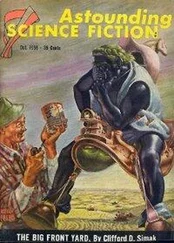“Just like that?” said Stiffy.
Stiffy held out his hand, “O.K., if that’s what you want to do. I’ll bank your half in the First Martian back on Earth. Leave my address there. Might want to get in touch with me some time.”
Meek gripped his hand. “You don’t need to do that. Take all of it. Just see the plant’s fixed up.”
Stiffy’s eyes shone queerly, moistly in the starlight. “Shucks, there’s enough for both of us. More than enough.” His voice was rough. “Now get along with you.”
Meek started to walk away.
“Goodbye, Stiffy,” he called.
“So long,” Stiffy shouted.
Meek hesitated. It seemed there should have been more he could have said. Some way to let Stiffy know he liked him. Some way to tell him he was a friend in a life which had known few friends.
He tried to think of ways to put what he felt in words, but there wasn’t any way, none that didn’t sound awkward and sentimental.
He wheeled about, headed for the space port. His feet went faster and faster, until finally he was running.
He had to get out of here, he told himself, before he got into another jam. His luck was stretched too thin already. A fellow just couldn’t go on having luck like that.
And besides, there was all of space to roam in, other places to see. That was what he had set out to do. To see the Solar System in his own ship, to do all the things he’d dreamed about back in the cubby hole at Lunar Exports, Inc.
And he was going to do just that, he promised himself. Although he hoped the next stop would be more peaceable.
Oliver Meek sighed happily – this was the life.
If one were forced to choose a single particular story that would most represent Clifford D. Simak’s best-known literary image, this would be that story: a story of the alien coming to backcountry middle America, told from the point of view of one of those country people. No one else – not even Cliff himself – ever did this better, nor ever will.
—dww
Coon Valley is a pleasant place, but there’s no denying it’s sort of off the beaten track and it’s not a place where you can count on getting rich because the farms are small and a lot of the ground is rough. You can farm the bottomlands, but the hillsides are only good for pasture and the roads are just dirt roads, impassable at certain times of year.
The old-timers, like Bert Smith and Jingo Harris and myself, are well satisfied to stay here, for we grew up with the country and we haven’t any illusions about getting rich and we’d feel strange and out-of-place anywhere but in the valley. But there are others, newcomers, who move in and get discouraged after a while and up and move away, so there usually is a farm or two standing idle, waiting to be sold.
We are just plain dirt farmers, with emphasis on the dirt, for we can’t afford a lot of fancy machinery and we don’t go in for blooded stock – but there’s nothing wrong with us; we’re just everyday, the kind of people you meet all over these United States. Because we’re out of the way and some of the families have lived here for so long, I suppose you could say that we have gotten clannish. But that doesn’t mean we don’t like outside folks; it just means we’ve lived so long together that we’ve got to know and like one another and are satisfied with things just as they are.
We have radios, of course, and we listen to the programs and the news, and some of us take daily papers, but I’m afraid that we may be a bit provincial, for it’s fairly hard to get us stirred up much about world happenings. There’s so much of interest right here in the valley we haven’t got the time to worry about all those outside things. I imagine you’d call us conservative, for most of us vote Republican without even wondering why and there’s none of us who has much time for all this government interference in the farming business.
The valley has always been a pleasant place – not only the land, but the people in it, and we’ve always been fortunate in the new neighbors that we get. Despite new ones coming in every year or so, we’ve never had a really bad one and that means a lot to us.
But we always worry a little when one of the new ones up and moves away and we speculate among ourselves, wondering what kind of people will buy or rent the vacant farm.
The old Lewis farm had been abandoned for a long time, the buildings all run down and gone to ruin and the fields gone back to grass. A dentist over at Hopkins Corners had rented it for several years and run some cattle in it, driving out on weekends to see how they were doing. We used to wonder every now and then if anyone would ever farm the place again, but finally we quit wondering, for the buildings had fallen into such disrepair that we figured no one ever would. I went in one day and talked to the banker at Hopkins Corners, who had the renting of the place, and told him I’d like to take it over if the dentist ever gave it up. But he told me the owners, who lived in Chicago then, were anxious to sell rather than to rent it, although he didn’t seem too optimistic that anyone would buy it.
Then one spring a new family moved onto the farm and in time we learned it had been sold and that the new family’s name was Heath – Reginald Heath. And Bert Smith said to me, “Reginald! That’s a hell of a name for a farmer!” But that was all he said.
Jingo Harris stopped by one day, coming home from town, when he saw Heath out in the yard, to pass the time of day. It was a neighborly thing to do, of course, and Heath seemed glad to have him stop, although Jingo said he seemed to be a funny kind of man to be a farmer.
“He’s a foreigner,” Jingo told me. “Sort of dark. Like he might be a Spaniard or from one of those other countries. I don’t know how he got that Reginald. Reginald is English and Heath’s no Englishman.”
Later on we heard that the Heaths weren’t really Spanish, but were Rumanians or Bulgarians and that they were refugees from the Iron Curtain.
But Spanish, or Rumanian, or Bulgarian, the Heaths were workers. There was Heath and his wife and a half-grown girl and all three of them worked all the blessed time. They paid attention to their business and didn’t bother anyone and because of this we liked them, although we didn’t have much to do with them. Not that we didn’t want to or that they didn’t want us to; it’s just that in a community like ours new folks sort of have to grow in instead of being taken in.
Heath had an old beaten-up, wired-together tractor that made a lot of noise, and as soon as the soil was dry enough to plow he started out to turn over the fields that through the years had grown up to grass. I used to wonder if he worked all night long, for many times when I went to bed I heard the tractor running. Although that may not be as late as it sounds to city dwellers, for here in the valley we go to bed early – and get up early, too.
One night after dark I set out to hunt some cows, a couple of fence-jumping heifers that gave me lots of trouble. Just let a man come in late from work and tired and maybe it’s raining a little and dark as the inside of a cat and those two heifers would turn up missing and I’d have to go and hunt them. I tried all the different kinds of pokes and none of them did any good. When a heifer gets to fence-jumping there isn’t much that can be done with her.
So I lit a lantern and set out to hunt for them, but I hunted for two hours and didn’t find a trace of them. I had just about decided to give up and go back home when I heard the sound of a tractor running and realized that I was just above the west field of the old Lewis place. To get home I’d have to go right past the field and I figured it might be as well to wait when I reached the field until the tractor came around and ask Heath if he had seen the heifers.
Читать дальше












